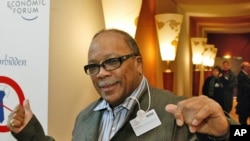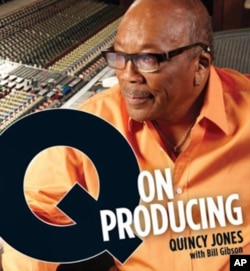The name, Quincy Jones, is synonymous with the best of American popular music.
Iin a career spanning more than five decades, the producer has garnered 79 Grammy nominations and taken home 27 of the prestigious awards - the most of any living musician.
Jones, 77, has just published "Q on Producing," the first of a planned autobiographical trilogy in which he shares his rich experience with a younger generation of musicians.
Thrills
Jones co-produced one of the bestselling music albums of all time.
Michael Jackson's "Thriller" has sold more than 104 million copies worldwide. It earned Jones and Jackson the Grammy for Album of the Year in 1983. The single, "Beat It," won Record of the Year, and the men shared the Grammy for Producer of the Year as well.
Two years later, Jones won two more Grammies as producer of the best-selling single of all time, "We are the World."
As someone who's received more Grammy nominations than anyone else, Jones clearly knows good music when he hears it.
"You say, what do I like, what touches me, what gives me goose bumps. If that happens, that's the best start," says Jones. "To me, the worst thing that can happen is to make a record that is based on what somebody else likes and you're not connected to it, and then they don't like it either."
Early life
Jones was born on March 14, 1933, in Chicago. He moved to Bremerton, Washington, when he was 10, which was a bit of a culture shock.
"We came from Chicago, the biggest black ghetto in America, during the Depression, the thirties," he says. "And my father took us out to the Northwest and it was a different thing, because we had no identity at all. There were no black people in the book."
Jones snagged his first professional job playing trumpet with Lionel Hampton's band in 1951. However, after suffering a brain aneurysm in 1974, doctors told him to give up the trumpet.
He's best known for his work behind the scenes. As a producer and arranger, he's worked with not only Michael Jackson but also Frank Sinatra, Aretha Franklin, Paul Simon and a host of other musicians.
He studied composition in France with Nadia Boulanger, who also taught Aaron Copeland.
"She said, 'Quincy, your music can never be more or less than you are as a human being, and there are only 11 notes. Just learn what everybody did with the music.' And I did, and I'm glad because it services me. What every you feel, you can do."
Color barrier
Jones has composed television themes, and scored major motion pictures.
Ray Charles, who sang the title song for 1967's "In the Heat of the Night," was a close friend. He and Jones first met as teenagers in Seattle, years before the Civil Rights era.
"We had to form these ideologies to survive. You know the tone in America at that time - even the military forces were not integrated. And Ray and I used to say to each other all the time, 'Not one drop of my self worth depends on you're acceptance of me.' We had that attitude to keep strong during any kind of adversity. We just kept our eyes on our dreams, and thank God, we realized a lot of our dreams."
In 1961, Quincy Jones broke the color barrier when he became vice-president of Mercury Records and the first high-level black executive of an established major record company.
With more than half a century in the music business, Jones shows no signs of slowing down. Over the years, he's expanded his reach into television and film production, magazine publishing and Broadway with "The Color Purple."
And a new generation is rediscovering some of Jones' older music.
"Soul Bossa Nova" was sampled by rapper Ludacris in his 2005 single "Number One Spot." It was also used in 1997 as the theme to the movie "Austin Powers: International Man of Mystery" and the theme for the 1998 World Cup competition. Jones wrote "Soul Bossa Nova" in 1962 - proof that a half-century later, the veteran music man has still got the groove.

